英语竞赛辅导计划
- 格式:doc
- 大小:31.50 KB
- 文档页数:2
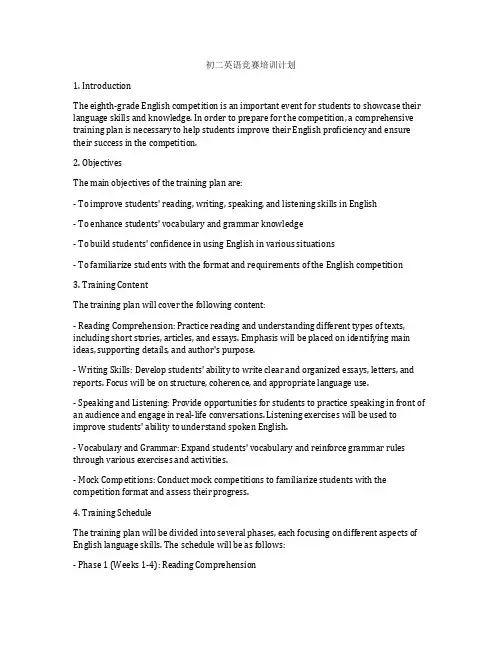
初二英语竞赛培训计划1. IntroductionThe eighth-grade English competition is an important event for students to showcase their language skills and knowledge. In order to prepare for the competition, a comprehensive training plan is necessary to help students improve their English proficiency and ensure their success in the competition.2. ObjectivesThe main objectives of the training plan are:- To improve students' reading, writing, speaking, and listening skills in English- To enhance students' vocabulary and grammar knowledge- To build students' confidence in using English in various situations- To familiarize students with the format and requirements of the English competition3. Training ContentThe training plan will cover the following content:- Reading Comprehension: Practice reading and understanding different types of texts, including short stories, articles, and essays. Emphasis will be placed on identifying main ideas, supporting details, and author's purpose.- Writing Skills: Develop students' ability to write clear and organized essays, letters, and reports. Focus will be on structure, coherence, and appropriate language use.- Speaking and Listening: Provide opportunities for students to practice speaking in front of an audience and engage in real-life conversations. Listening exercises will be used to improve students' ability to understand spoken English.- Vocabulary and Grammar: Expand students' vocabulary and reinforce grammar rules through various exercises and activities.- Mock Competitions: Conduct mock competitions to familiarize students with the competition format and assess their progress.4. Training ScheduleThe training plan will be divided into several phases, each focusing on different aspects of English language skills. The schedule will be as follows:- Phase 1 (Weeks 1-4): Reading Comprehension- Phase 2 (Weeks 5-8): Writing Skills- Phase 3 (Weeks 9-12): Speaking and Listening- Phase 4 (Weeks 13-16): Vocabulary and Grammar- Phase 5 (Weeks 17-20): Mock Competitions and Review5. Training MethodsThe training methods will include a variety of activities to engage students and cater to different learning styles:- Lectures and Discussions: Provide students with important information and opportunities to ask questions and share their thoughts.- Group Activities: Encourage students to work together in small groups to complete tasks and solve problems.- Role-Playing: Engage students in role-playing scenarios to practice real-life conversation and public speaking.- Games and Quizzes: Use interactive games and quizzes to reinforce vocabulary and grammar concepts.- Practice Tests: Administer regular practice tests to assess students' progress and identify areas for improvement.6. AssessmentAssessment will be an integral part of the training plan to monitor students' progress and ensure that they are on track to meet the objectives. The following assessment methods will be used:- Pre- and Post-Tests: Administer pre-tests at the beginning of each phase and post-tests at the end to measure students' improvement.- Class Participation: Evaluate students' active participation in class activities and discussions.- Homework Assignments: Grade students' homework assignments to gauge their understanding and application of the concepts learned in class.- Mock Competitions: Assess students' performance in mock competitions to identify areas for further improvement.7. ResourcesThe following resources will be utilized to support the training plan:- Textbooks and Workbooks: Provide students with relevant reading materials and exercises to practice their English skills.- Audio and Visual Aids: Use audio recordings and videos to enhance students' listening and speaking abilities.- Online Resources: Utilize websites and online platforms for additional practice and reinforcement of English language skills.- Sample Competition Materials: Provide students with past competition papers and sample questions to familiarize them with the competition format.8. ConclusionThe eighth-grade English competition training plan aims to provide students with the necessary skills and knowledge to excel in the competition. By following a structured training schedule, utilizing various training methods, and consistently assessing students' progress, we are confident that students will be well-prepared and ready to showcase their English abilities in the competition.。
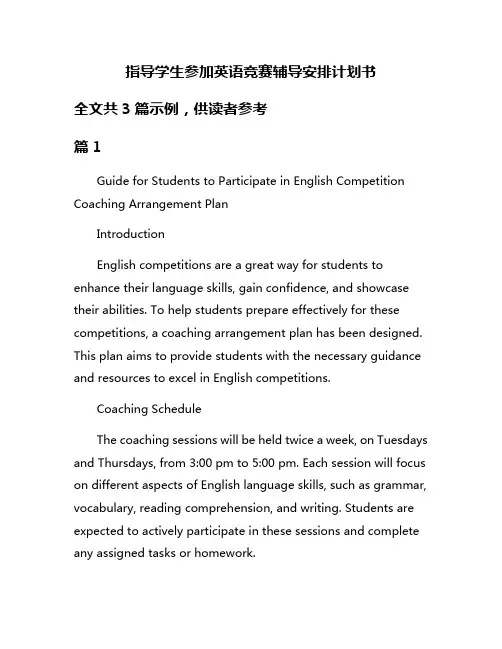
指导学生参加英语竞赛辅导安排计划书全文共3篇示例,供读者参考篇1Guide for Students to Participate in English Competition Coaching Arrangement PlanIntroductionEnglish competitions are a great way for students to enhance their language skills, gain confidence, and showcase their abilities. To help students prepare effectively for these competitions, a coaching arrangement plan has been designed. This plan aims to provide students with the necessary guidance and resources to excel in English competitions.Coaching ScheduleThe coaching sessions will be held twice a week, on Tuesdays and Thursdays, from 3:00 pm to 5:00 pm. Each session will focus on different aspects of English language skills, such as grammar, vocabulary, reading comprehension, and writing. Students are expected to actively participate in these sessions and complete any assigned tasks or homework.Coaching MaterialsA variety of materials will be provided to students during the coaching sessions. This includes textbooks, workbooks, online resources, practice tests, and sample essays. Students are encouraged to make use of these materials to improve their English language skills and prepare for the competition.Coaching TeamThe coaching team consists of experienced English language teachers and native speakers who are proficient in English. These coaches will provide personalized feedback, guidance, and support to students throughout the coaching sessions. Students can approach the coaches with any questions or concerns they may have regarding their preparation for the competition.Mock TestsMock tests will be conducted regularly to assess the progress of students and identify areas for improvement. These tests will simulate the conditions of the actual competition and help students familiarize themselves with the format and structure of the competition. Feedback will be provided to students after each mock test to help them understand their strengths and weaknesses.Peer SupportStudents will be encouraged to participate in peer study groups to practice their English language skills with their peers. This will provide them with an opportunity to collaborate, share ideas, and receive feedback from their classmates. Peer support can greatly enhance the learning experience and help students build confidence in their abilities.Parental InvolvementParents are encouraged to actively participate in their child's preparation for the English competition. They can support their child by providing a conducive study environment, monitoring their progress, and encouraging them to stay focused and motivated. Parents can also communicate with the coaching team to discuss their child's learning needs and receive updates on their performance.ConclusionBy following this coaching arrangement plan, students will be well-prepared to participate in English competitions and showcase their language skills. The coaching team is committed to providing students with the guidance, resources, and support they need to succeed in the competition. With dedication, hardwork, and determination, students can achieve their goals and excel in the English competition.篇2Title: Guidance Plan for Students to Participate in English CompetitionsIntroductionEnglish competitions provide students with a valuable opportunity to showcase their language skills and knowledge. To ensure that students are well-prepared for these competitions, it is important to provide them with the necessary guidance and support. This guidance plan aims to outline the strategies and resources that will be utilized to help students successfully participate in English competitions.GoalsThe main goal of this guidance plan is to help students improve their English language proficiency and excel in English competitions. Specific goals include:1. Enhancing students' reading, writing, speaking, and listening skills in English.2. Familiarizing students with the format and requirements of English competitions.3. Providing students with practice opportunities to build confidence and proficiency in English.4. Encouraging students to participate in extracurricular activities related to English language and literature.Guidance Strategies1. Language Skills Development: Students will participate in language workshops and activities focusing on reading, writing, speaking, and listening skills in English. These activities will be designed to improve students' proficiency in each of these areas.2. Competition Preparation: Students will receive guidance on how to prepare for English competitions, including tips on effective study habits, time management, and stress management. Mock tests and practice sessions will also be organized to help students familiarize themselves with the competition format.3. Resource Materials: Students will have access to a variety of resources, including textbooks, reference materials, online resources, and study guides. These resources will be selected toenhance students' understanding of English language and literature.4. Mentoring and Coaching: Experienced teachers and mentors will provide students with guidance and support throughout their preparation for English competitions. They will offer feedback, encouragement, and advice to help students improve their language skills and performance.5. Extracurricular Activities: Students will be encouraged to participate in extracurricular activities such as English language clubs, debates, drama clubs, and writing competitions. These activities will provide students with valuable opportunities to practice their English skills in real-world settings.TimelineThis guidance plan will be implemented over a period of six months, with regular workshops, practice sessions, and mentoring sessions scheduled throughout the duration. The timeline for the plan is as follows:- Month 1-2: Language skills development workshops- Month 3: Competition preparation and mock tests- Month 4-5: Resource materials and mentoring sessions- Month 6: Extracurricular activities and final preparations for English competitionsEvaluationThroughout the implementation of the guidance plan, student progress will be monitored and evaluated regularly. Feedback will be collected from students, teachers, and mentors to assess the effectiveness of the plan and identify areas for improvement. The success of the plan will be determined based on students' performance in English competitions and their overall improvement in English language skills.ConclusionParticipating in English competitions can be a rewarding experience for students, but proper guidance and support are essential to help them succeed. This guidance plan aims to provide students with the tools and resources they need to excel in English competitions and improve their language skills. By following the strategies outlined in this plan, students will be well-prepared to showcase their talents and compete successfully in English competitions.篇3Guidance Plan for Students Participating in English Competition CoachingIntroduction:Competing in an English competition can be a great opportunity for students to showcase their language skills and boost their confidence. However, preparing for such competitions can be quite challenging without proper guidance and coaching. This plan aims to provide a structured approach to help students excel in English competitions.Goals:1. To improve students' English language skills, including vocabulary, grammar, speaking, listening, reading, and writing.2. To enhance students' ability to interpret and analyze English texts effectively.3. To boost students' confidence in speaking and writing in English.4. To equip students with the necessary strategies and techniques to excel in English competitions.Plan Overview:1. Diagnostic Assessment:Before starting the coaching sessions, students will undergo a diagnostic assessment to identify their strengths and weaknesses in various English language skills. This assessment will help in devising individualized coaching plans for each student.2. Individualized Coaching:Based on the diagnostic assessment results, students will receive personalized coaching sessions focusing on their areas of improvement. These coaching sessions will include:- Vocabulary building exercises- Grammar drills and exercises- Reading comprehension strategies- Writing practice and feedback- Speaking and listening exercises3. Mock Tests and Practice Sessions:Regular mock tests and practice sessions will be conducted to assess students' progress and prepare them for the competition format. These mock tests will simulate the competition conditions and help students familiarize themselves with the exam structure.4. Strategy Workshops:Special workshops will be organized to introduce students to effective strategies and techniques for excelling in English competitions. These workshops will cover:- Time management techniques- Answering strategies for different question types- Tips for effective writing and speaking- Note-taking and summarizing techniques5. Feedback and Evaluation:Continuous feedback and evaluation will be provided to students to track their progress and identify areas for improvement. This feedback will help students focus on their weaknesses and work towards enhancing their skills.6. Revision and Review:Revision sessions will be conducted to reinforce key concepts and strategies learned during the coaching sessions. Students will be encouraged to review their notes and practice regularly to ensure retention of knowledge.7. Motivational Support:Encouragement and motivation will be provided to students throughout the coaching process to keep them engaged and focused on their goals. Positive reinforcement and praise will be given to boost students' confidence and morale.Conclusion:Participating in an English competition can be a rewarding experience for students, but it requires dedication and proper guidance to succeed. This guidance plan aims to equip students with the necessary skills and strategies to excel in English competitions. By following this structured approach, students can enhance their English language proficiency and gain confidence in their abilities. With the right guidance and support, students can achieve success in English competitions and showcase their talent to the world.。
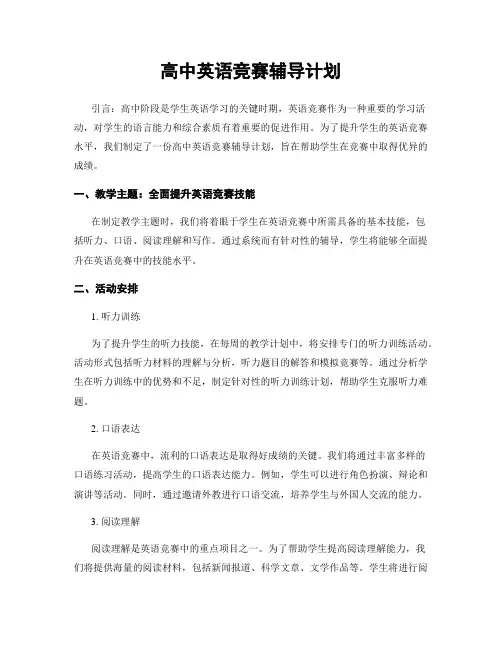
高中英语竞赛辅导计划引言:高中阶段是学生英语学习的关键时期,英语竞赛作为一种重要的学习活动,对学生的语言能力和综合素质有着重要的促进作用。
为了提升学生的英语竞赛水平,我们制定了一份高中英语竞赛辅导计划,旨在帮助学生在竞赛中取得优异的成绩。
一、教学主题:全面提升英语竞赛技能在制定教学主题时,我们将着眼于学生在英语竞赛中所需具备的基本技能,包括听力、口语、阅读理解和写作。
通过系统而有针对性的辅导,学生将能够全面提升在英语竞赛中的技能水平。
二、活动安排1. 听力训练为了提升学生的听力技能,在每周的教学计划中,将安排专门的听力训练活动。
活动形式包括听力材料的理解与分析,听力题目的解答和模拟竞赛等。
通过分析学生在听力训练中的优势和不足,制定针对性的听力训练计划,帮助学生克服听力难题。
2. 口语表达在英语竞赛中,流利的口语表达是取得好成绩的关键。
我们将通过丰富多样的口语练习活动,提高学生的口语表达能力。
例如,学生可以进行角色扮演、辩论和演讲等活动。
同时,通过邀请外教进行口语交流,培养学生与外国人交流的能力。
3. 阅读理解阅读理解是英语竞赛中的重点项目之一。
为了帮助学生提高阅读理解能力,我们将提供海量的阅读材料,包括新闻报道、科学文章、文学作品等。
学生将进行阅读材料的理解和分析,学习如何快速抓住关键信息。
此外,还将组织学生进行解题训练,包括选择题、填空题和判断题等,使学生掌握解题技巧。
4. 写作技巧写作是英语竞赛中的一项重要环节。
为了提高学生的写作水平,我们将组织各类写作活动,如作文比赛、写作讨论等。
通过学习范文、分享习作和互相批改等方式,帮助学生提高写作表达能力和文学素养。
三、教材使用为了培养学生的竞赛思维和解题技巧,我们将精选一些高质量的教材作为辅导资料。
这些教材包括英语竞赛辅导书籍、模拟试题集和历年真题。
通过让学生深入理解教材内容,并进行实践运用,学生将更好地掌握知识点和技巧,为竞赛打下坚实基础。
四、总结通过高中英语竞赛辅导计划的实施,我们相信学生的英语竞赛水平将能够得到明显提升。

英语竞赛计划方案一、背景介绍英语竞赛是一项旨在提高学生英语语言能力和综合应用能力的活动。
本计划旨在为学生提供一个全面的竞赛方案,以帮助他们在英语竞赛中取得优异的成绩。
二、目标设定1. 提高学生的英语听、说、读、写能力。
2. 培养学生的团队合作和竞争意识。
3. 培养学生的英语自信心和表达能力。
4. 提高学生的综合运用英语的能力。
三、计划内容1. 基础知识训练a. 提供英语基础知识的学习资料,包括词汇、语法、句型等。
b. 组织定期的知识测试,检查学生的掌握情况,并针对性地进行辅导。
2. 听力训练a. 提供丰富多样的听力材料,包括录音、对话、新闻等。
b. 组织听力训练活动,如听力竞赛、听力理解练习等。
3. 口语训练a. 组织口语练习活动,如角色扮演、辩论赛等。
b. 提供口语训练资料,包括口语练习题、口语范文等。
4. 阅读训练a. 提供丰富的英语阅读材料,包括文章、报纸、杂志等。
b. 组织阅读理解练习,提高学生的阅读理解能力。
5. 写作训练a. 提供写作训练资料,包括写作题目、写作指导等。
b. 组织写作比赛,鼓励学生展示自己的写作才能。
6. 翻译训练a. 提供翻译练习题,包括中译英和英译中的练习。
b. 组织翻译比赛,培养学生的翻译能力和跨文化交流能力。
7. 知识应用训练a. 提供实际场景下的英语应用练习,如购物、旅游、求职等。
b. 组织实践活动,让学生将所学知识应用到实际生活中。
8. 团队合作训练a. 组织小组活动,培养学生的团队合作和协作能力。
b. 组织团队竞赛,激发学生的竞争意识和团队精神。
四、计划实施1. 组织竞赛a. 设计英语竞赛的题目和规则。
b. 组织初赛、复赛和决赛,选拔出优胜者。
2. 提供辅导a. 安排专业的英语教师进行辅导,解答学生的问题。
b. 定期组织辅导班,帮助学生提高英语水平。
3. 提供学习资源a. 建立英语学习资源库,包括书籍、电子资料等。
b. 提供学习平台,让学生随时随地进行学习。

英语竞赛计划方案引言概述:英语竞赛计划是一项重要的活动,旨在提高学生的英语水平和竞争能力。
本文将介绍一个完整的英语竞赛计划方案,包括准备阶段、培训阶段、比赛阶段和总结阶段。
一、准备阶段:1.1 确定目标:明确参赛队伍的目标,是提高英语水平还是争取好成绩。
1.2 确定时间:根据学校的日程安排和竞赛日期,确定准备阶段的时间安排。
1.3 确定资源:寻觅合适的教材、参考书籍和在线资源,为学生提供全面的学习资料。
二、培训阶段:2.1 词汇和语法训练:通过词汇和语法练习,匡助学生巩固基础知识。
2.2 听力和口语训练:组织听力和口语练习,提高学生的听力理解和口语表达能力。
2.3 阅读和写作训练:引导学生阅读英文文章,并进行写作练习,提升阅读和写作能力。
三、比赛阶段:3.1 报名注册:按照竞赛规定,及时完成报名注册手续。
3.2 摹拟演练:组织摹拟竞赛,让学生熟悉竞赛形式和规则,提高应试能力。
3.3 策略指导:针对不同类型的竞赛题目,赋予学生相应的策略指导,匡助他们更好地应对考试。
四、总结阶段:4.1 成绩分析:对参赛学生的成绩进行分析,找出问题和不足之处。
4.2 经验总结:总结整个竞赛过程中的经验和教训,为下一次竞赛做好准备。
4.3 奖励和鼓励:对参赛学生赋予适当的奖励和鼓励,激励他们继续努力学习英语。
通过以上的准备、培训、比赛和总结四个阶段,一个完整的英语竞赛计划方案得以实施。
这个方案可以匡助学生提高英语水平,增强竞争力,并为他们日后的学习和职业发展打下坚实的基础。
同时,这个方案也需要学校和教师的共同努力和支持,确保计划的顺利进行。
希翼通过这个方案,更多的学生能够在英语竞赛中取得优异的成绩。
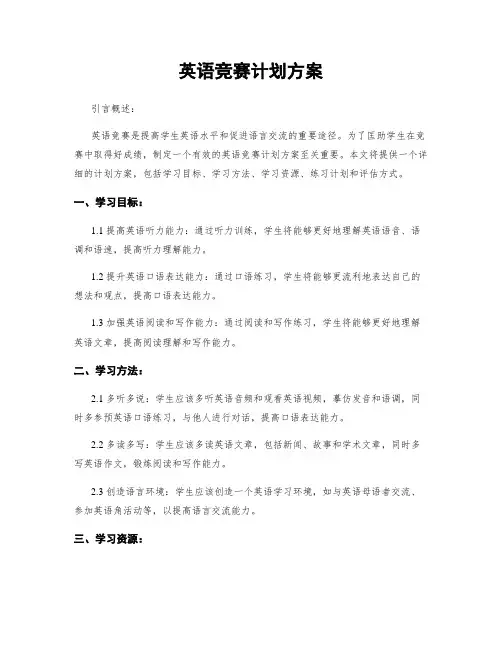
英语竞赛计划方案引言概述:英语竞赛是提高学生英语水平和促进语言交流的重要途径。
为了匡助学生在竞赛中取得好成绩,制定一个有效的英语竞赛计划方案至关重要。
本文将提供一个详细的计划方案,包括学习目标、学习方法、学习资源、练习计划和评估方式。
一、学习目标:1.1 提高英语听力能力:通过听力训练,学生将能够更好地理解英语语音、语调和语速,提高听力理解能力。
1.2 提升英语口语表达能力:通过口语练习,学生将能够更流利地表达自己的想法和观点,提高口语表达能力。
1.3 加强英语阅读和写作能力:通过阅读和写作练习,学生将能够更好地理解英语文章,提高阅读理解和写作能力。
二、学习方法:2.1 多听多说:学生应该多听英语音频和观看英语视频,摹仿发音和语调,同时多参预英语口语练习,与他人进行对话,提高口语表达能力。
2.2 多读多写:学生应该多读英语文章,包括新闻、故事和学术文章,同时多写英语作文,锻炼阅读和写作能力。
2.3 创造语言环境:学生应该创造一个英语学习环境,如与英语母语者交流、参加英语角活动等,以提高语言交流能力。
三、学习资源:3.1 英语教材和参考书:学生应该选择适合自己水平和需求的英语教材和参考书,如《剑桥英语考试教程》和《牛津英语语法指南》等,以提供系统的学习内容和语法知识。
3.2 在线学习平台:学生可以利用在线学习平台,如Coursera和EdX等,参加英语课程和听力训练,获取更多学习资源。
3.3 英语学习应用程序:学生可以下载一些英语学习应用程序,如Duolingo和Memrise等,进行词汇记忆和语法练习,提高学习效果。
四、练习计划:4.1 制定学习计划:学生应该制定一个详细的学习计划,包括每天的学习时间、学习内容和学习目标,以保证有系统地进行英语学习。
4.2 划分学习阶段:学生应该将学习过程划分为不同的阶段,如听力训练阶段、口语练习阶段、阅读理解阶段和写作训练阶段,以便有针对性地进行学习。
4.3 定期复习和测试:学生应该定期进行复习和测试,巩固所学知识,发现问题并及时调整学习计划。
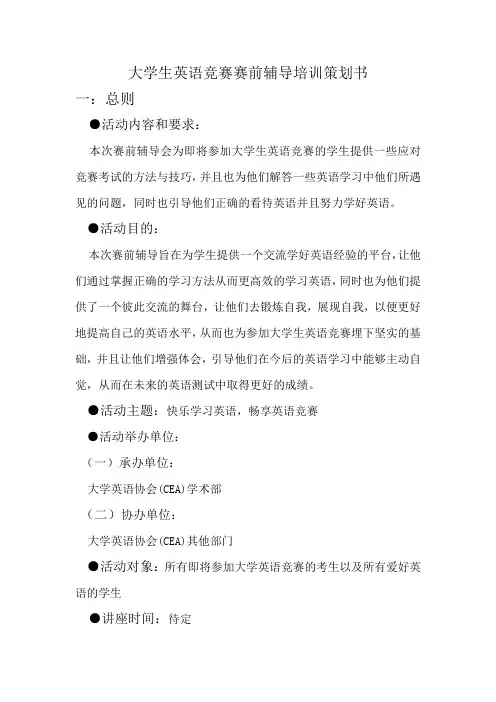
大学生英语竞赛赛前辅导培训策划书一:总则●活动内容和要求:本次赛前辅导会为即将参加大学生英语竞赛的学生提供一些应对竞赛考试的方法与技巧,并且也为他们解答一些英语学习中他们所遇见的问题,同时也引导他们正确的看待英语并且努力学好英语。
●活动目的:本次赛前辅导旨在为学生提供一个交流学好英语经验的平台,让他们通过掌握正确的学习方法从而更高效的学习英语,同时也为他们提供了一个彼此交流的舞台,让他们去锻炼自我,展现自我,以便更好地提高自己的英语水平,从而也为参加大学生英语竞赛埋下坚实的基础,并且让他们增强体会,引导他们在今后的英语学习中能够主动自觉,从而在未来的英语测试中取得更好的成绩。
●活动主题:快乐学习英语,畅享英语竞赛●活动举办单位:(一)承办单位:大学英语协会(CEA)学术部(二)协办单位:大学英语协会(CEA)其他部门●活动对象:所有即将参加大学英语竞赛的考生以及所有爱好英语的学生●讲座时间:待定●讲座地点:待定二:准备●活动前准备:(一)做好活动的整体策划(讲座前一周完成)(二)统计参加活动的人员名单(讲座前三天完成)(三)贴海报,做展板,发宣传单(讲座前一周完成)(四)申请教室(讲座前五天完成)(五)请活动嘉宾(讲座前一周完成)活动嘉宾:英语学院老师(待定),大学英语协会会长,副会长,学术部部长,上届大学生英语竞赛获得优异成绩的学生代表(六)由项目管理部人员布置会场(讲座前半天完成)三:宣传计划●活动宣传:A:海报:水房前(一张)宿舍楼显眼区(若干张)天象(若干张)四个食堂前(各贴一张)B:展板:每个路口处各放宣传展板一块四:人员配置主持人:待定主持人安排:●主持人需在活动开始前期熟悉整个讲座的基本流程。
●主持人根据各个环节做好主持人记录,记录内容涉及各个演讲嘉宾的大致讲说内容以及讲座中每个环节的衔接语言。
●主持人需注意活动过程中可能出现问题的处理预案,创造一个场面活跃,学生积极,秩序井然的讲座场面,让学生在快乐的英语氛围中学到更多的知识方法。
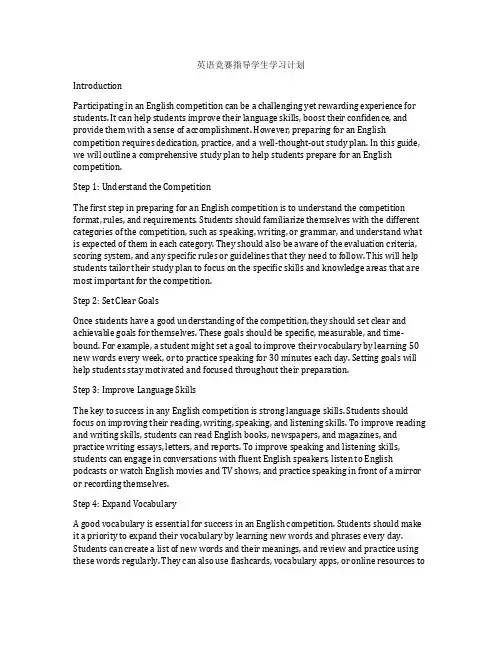
英语竞赛指导学生学习计划IntroductionParticipating in an English competition can be a challenging yet rewarding experience for students. It can help students improve their language skills, boost their confidence, and provide them with a sense of accomplishment. However, preparing for an English competition requires dedication, practice, and a well-thought-out study plan. In this guide, we will outline a comprehensive study plan to help students prepare for an English competition.Step 1: Understand the CompetitionThe first step in preparing for an English competition is to understand the competition format, rules, and requirements. Students should familiarize themselves with the different categories of the competition, such as speaking, writing, or grammar, and understand what is expected of them in each category. They should also be aware of the evaluation criteria, scoring system, and any specific rules or guidelines that they need to follow. This will help students tailor their study plan to focus on the specific skills and knowledge areas that are most important for the competition.Step 2: Set Clear GoalsOnce students have a good understanding of the competition, they should set clear and achievable goals for themselves. These goals should be specific, measurable, and time-bound. For example, a student might set a goal to improve their vocabulary by learning 50 new words every week, or to practice speaking for 30 minutes each day. Setting goals will help students stay motivated and focused throughout their preparation.Step 3: Improve Language SkillsThe key to success in any English competition is strong language skills. Students should focus on improving their reading, writing, speaking, and listening skills. To improve reading and writing skills, students can read English books, newspapers, and magazines, and practice writing essays, letters, and reports. To improve speaking and listening skills, students can engage in conversations with fluent English speakers, listen to English podcasts or watch English movies and TV shows, and practice speaking in front of a mirror or recording themselves.Step 4: Expand VocabularyA good vocabulary is essential for success in an English competition. Students should make it a priority to expand their vocabulary by learning new words and phrases every day. Students can create a list of new words and their meanings, and review and practice using these words regularly. They can also use flashcards, vocabulary apps, or online resources toaid their learning. As a bonus, students can try to apply their new words in daily conversations to ensure their retention.Step 5: Practice RegularlyRegular practice is crucial for improving language skills and gaining confidence. Students should set aside dedicated time each day to practice different aspects of English, such as reading, writing, speaking, and listening. They can also take advantage of online resources and practice tests to simulate the competition environment and assess their progress. Furthermore, participating in mock competitions or English clubs can give students valuable exposure to real competition scenarios.Step 6: Seek FeedbackSeeking feedback from teachers, peers, or mentors is an important part of the preparation process. Students should ask for feedback on their writing, speaking, and overall language proficiency. Constructive criticism and suggestions for improvement from others can help students identify their weaknesses and work on them more effectively.Step 7: Stay Updated with Current AffairsMany English competitions include topics related to current affairs, culture, or global events. Students should stay updated with current news, trends, and developments, and be well-informed about important issues and debates. This knowledge can be used to add depth and relevance to their essays, speeches, or discussions during the competition.ConclusionPreparing for an English competition can be a challenging but rewarding experience for students. By following a well-structured study plan and committing to regular practice and improvement, students can significantly enhance their language skills and excel in the competition. The key to success lies in setting clear goals, dedicating time to practice, seeking feedback, and staying motivated throughout the preparation period. As a result, students will not only be better prepared for the competition but also build a strong foundation for their future language learning and academic endeavors.。
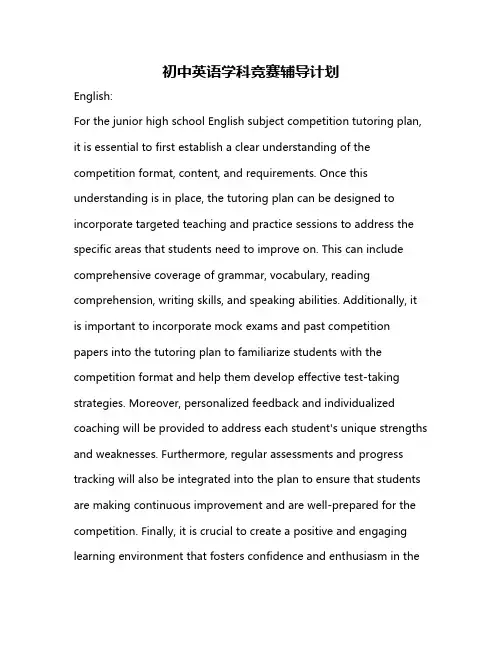
初中英语学科竞赛辅导计划English:For the junior high school English subject competition tutoring plan, it is essential to first establish a clear understanding of the competition format, content, and requirements. Once this understanding is in place, the tutoring plan can be designed to incorporate targeted teaching and practice sessions to address the specific areas that students need to improve on. This can include comprehensive coverage of grammar, vocabulary, reading comprehension, writing skills, and speaking abilities. Additionally, it is important to incorporate mock exams and past competition papers into the tutoring plan to familiarize students with the competition format and help them develop effective test-taking strategies. Moreover, personalized feedback and individualized coaching will be provided to address each student's unique strengths and weaknesses. Furthermore, regular assessments and progress tracking will also be integrated into the plan to ensure that students are making continuous improvement and are well-prepared for the competition. Finally, it is crucial to create a positive and engaging learning environment that fosters confidence and enthusiasm in thestudents, as well as instilling a love for the English language and its application in real-life situations.中文翻译:对于初中英语学科竞赛辅导计划而言,首先需要明确了解竞赛的格式、内容和要求。
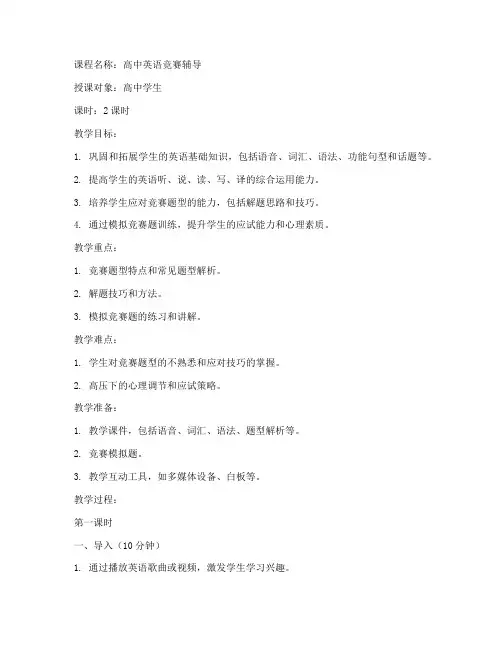
课程名称:高中英语竞赛辅导授课对象:高中学生课时:2课时教学目标:1. 巩固和拓展学生的英语基础知识,包括语音、词汇、语法、功能句型和话题等。
2. 提高学生的英语听、说、读、写、译的综合运用能力。
3. 培养学生应对竞赛题型的能力,包括解题思路和技巧。
4. 通过模拟竞赛题训练,提升学生的应试能力和心理素质。
教学重点:1. 竞赛题型特点和常见题型解析。
2. 解题技巧和方法。
3. 模拟竞赛题的练习和讲解。
教学难点:1. 学生对竞赛题型的不熟悉和应对技巧的掌握。
2. 高压下的心理调节和应试策略。
教学准备:1. 教学课件,包括语音、词汇、语法、题型解析等。
2. 竞赛模拟题。
3. 教学互动工具,如多媒体设备、白板等。
教学过程:第一课时一、导入(10分钟)1. 通过播放英语歌曲或视频,激发学生学习兴趣。
2. 引导学生回顾已学过的英语知识,为竞赛辅导做铺垫。
二、基础知识讲解(30分钟)1. 语音:重点讲解英语音标、发音规则和连读技巧。
2. 词汇:介绍高频词汇、短语及搭配,帮助学生扩大词汇量。
3. 语法:讲解竞赛中常见的语法点,如时态、语态、非谓语动词等。
4. 功能句型和话题:总结并讲解各类功能句型和话题,提高学生的实际运用能力。
三、题型解析(20分钟)1. 阅读理解:分析题型特点,讲解解题步骤和技巧。
2. 完形填空:介绍解题思路,强调语境和逻辑关系。
3. 写作:指导学生掌握不同类型写作的技巧,如记叙文、议论文等。
四、课堂练习(10分钟)1. 学生进行基础知识练习,巩固所学内容。
2. 教师巡回指导,解答学生疑问。
第二课时一、复习导入(10分钟)1. 复习上一节课所学内容,检查学生的学习效果。
2. 针对学生薄弱环节进行针对性讲解。
二、模拟竞赛题训练(40分钟)1. 学生分组进行模拟竞赛题训练,提高应试能力。
2. 教师巡回指导,解答学生疑问。
三、解题技巧讲解(20分钟)1. 针对学生在模拟竞赛题训练中遇到的问题,讲解解题技巧和方法。
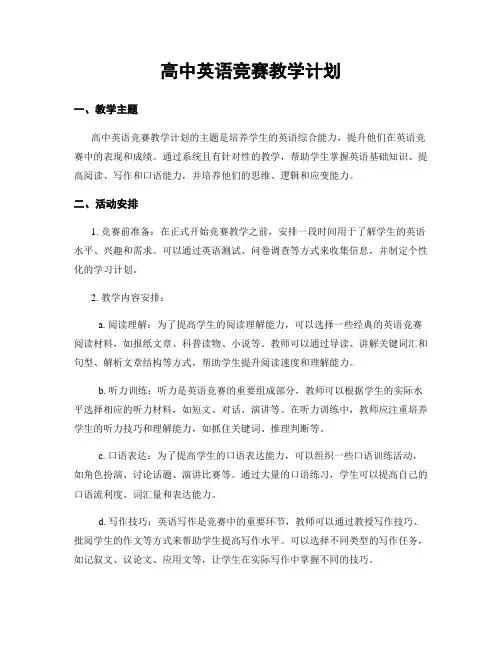
高中英语竞赛教学计划一、教学主题高中英语竞赛教学计划的主题是培养学生的英语综合能力,提升他们在英语竞赛中的表现和成绩。
通过系统且有针对性的教学,帮助学生掌握英语基础知识、提高阅读、写作和口语能力,并培养他们的思维、逻辑和应变能力。
二、活动安排1. 竞赛前准备:在正式开始竞赛教学之前,安排一段时间用于了解学生的英语水平、兴趣和需求。
可以通过英语测试、问卷调查等方式来收集信息,并制定个性化的学习计划。
2. 教学内容安排:a. 阅读理解:为了提高学生的阅读理解能力,可以选择一些经典的英语竞赛阅读材料,如报纸文章、科普读物、小说等。
教师可以通过导读、讲解关键词汇和句型、解析文章结构等方式,帮助学生提升阅读速度和理解能力。
b. 听力训练:听力是英语竞赛的重要组成部分,教师可以根据学生的实际水平选择相应的听力材料,如短文、对话、演讲等。
在听力训练中,教师应注重培养学生的听力技巧和理解能力,如抓住关键词、推理判断等。
c. 口语表达:为了提高学生的口语表达能力,可以组织一些口语训练活动,如角色扮演、讨论话题、演讲比赛等。
通过大量的口语练习,学生可以提高自己的口语流利度、词汇量和表达能力。
d. 写作技巧:英语写作是竞赛中的重要环节,教师可以通过教授写作技巧、批阅学生的作文等方式来帮助学生提高写作水平。
可以选择不同类型的写作任务,如记叙文、议论文、应用文等,让学生在实际写作中掌握不同的技巧。
3. 活动组织安排:a. 辅导课程:定期组织辅导课程,包括解析竞赛真题、讲解答题技巧、模拟练习等。
通过这些课程,学生可以熟悉竞赛的题型和要求,提前进行针对性的练习和训练。
b. 小组活动:分组安排学生进行小组活动,如讨论、合作完成任务等。
通过小组活动,可以培养学生的团队合作精神和沟通能力,同时提高学生的学习效果和竞赛成绩。
c. 竞赛经验分享:邀请曾参加过英语竞赛并取得优异成绩的学生进行经验分享,让其他学生了解成功的经验和策略。
这不仅可以激发学生的学习兴趣和动力,还可以提供有效的学习指导。
初中英语竞赛辅导计划English:To prepare for a middle school English competition, it is important to have a structured study plan in place. This plan should include regular practice of the four language skills: reading, writing, listening, and speaking. For reading, students should be exposed to various types of texts, such as short stories, articles, and news reports, to improve their reading comprehension and vocabulary. Writing practice should involve different types of composition, such as narratives, descriptions, and argumentative essays, to develop their writing skills. Listening exercises could include listening to recordings of native speakers, watching English movies or TV shows, and participating in group discussions. Speaking practice can be done through role-plays, presentations, debates, and conversational activities. In addition to language skills, it is important for students to familiarize themselves with common grammar rules, sentence structures, and vocabulary. Lastly, mock tests and past competition papers should be incorporated into the study plan to simulate the competition environment and assess the students' progress.Translated content:为了准备初中英语竞赛,有一个有结构的学习计划是很重要的。
高中二年级英语竞赛备考计划三篇《篇一》作为一名高中生,英语竞赛对我而言是一个很好的提升自己英语水平的机会。
为了在竞赛中取得好成绩,我需要制定一个详细的备考计划,确保自己在短时间内提高英语能力。
本文将详细阐述我的备考计划,包括工作内容、工作规划、工作设想、工作计划、工作要点、工作方案和工作安排。
1.提高词汇量:通过阅读、记忆和使用单词,增加自己的词汇储备。
2.提升语法水平:学习并掌握高中英语语法知识点,提高语法运用能力。
3.提高阅读理解能力:通过阅读各类英文,提高自己的阅读速度和理解能力。
4.提高写作能力:练习写作,包括句子、段落和,提高表达清晰、逻辑严谨的能力。
5.提高听力水平:通过听力训练,提高自己对英语语音和语调的辨识能力。
6.第一阶段(1-2周):重点关注词汇量和语法学习,每天记忆一定数量的单词,学习并巩固语法知识点。
7.第二阶段(3-4周):在第一阶段的基础上,增加阅读理解训练,每天阅读一篇英文,提高阅读速度和理解能力。
8.第三阶段(5-6周):在第一阶段和第二阶段的基础上,开始练习写作,从句子到段落,再到,逐步提高写作能力。
9.第四阶段(7-8周):在前面三个阶段的基础上,加强听力训练,每天进行一定时间的听力练习,提高听力水平。
10.通过制定合理的学习计划,确保自己在每个阶段都有明确的学习目标。
11.利用课余时间进行英语学习,合理安排时间,不影响其他学科的学习。
12.积极参与学校组织的英语角活动,与他人交流学习心得,提高自己的实际运用能力。
13.寻找合适的英语学习资料,如教材、练习册、英文等,辅助自己的学习。
14.每天制定学习计划,确保完成规定的学习任务。
15.每周进行一次自我检测,检验自己在各个方面的进步。
16.定期与同学或老师交流学习心得,互相借鉴学习方法。
17.及时调整学习计划,根据自己的学习进度和实际情况进行调整。
18.坚持学习,保持学习的积极性和持续性。
19.注重实际运用,将所学知识运用到日常交流和写作中。
小学英语竞赛辅导计划English:The primary school English competition coaching program aims to provide comprehensive guidance and support to students in their preparation for English competitions. The program covers various aspects, including vocabulary, grammar, reading comprehension, and speaking skills.To begin with, the program focuses on building students' vocabulary. Regular vocabulary exercises and quizzes are conducted to help students improve their word recognition and usage. In addition, word banks and flashcards are used to enhance their memorization and understanding of new words.Furthermore, the program emphasizes the mastery of grammar rules. Through engaging activities and exercises, students learn to identify and apply different grammatical structures accurately. They also receive guidance on common grammar mistakes to avoid.In terms of reading comprehension, the program provides practice materials that expose students to a wide range of texts. Students are taught strategies to analyze and understand the main ideas, supporting details, and infer meaning from context. Regular reading practice helps enhance their reading speed and comprehension skills.Moreover, the program focuses on improving students' speaking skills. Various speaking activities, such as role-plays, presentations, and debates, are incorporated to enhance fluency, pronunciation, and confidence in speaking English. Students are encouraged to interact with their peers and participate actively in discussions to develop critical thinking and communication skills.Throughout the program, students are given ample opportunities to practice and apply what they have learned through mock competitions and individual presentations. Feedback and evaluation sessions are conducted to identify strengths and areas for improvement.In conclusion, the primary school English competition coaching program is designed to equip students with the necessary skills andknowledge to excel in English competitions. By focusing on vocabulary, grammar, reading comprehension, and speaking skills, the program aims to foster well-rounded English proficiency and confidence in students' language abilities.中文翻译:小学英语竞赛辅导计划旨在为学生在英语竞赛中的准备提供全面的指导和支持。
英语口语技能大赛辅导方案一、背景与目标随着全球化的深入发展,英语口语能力已成为现代人才必备的技能之一。
为了提高学生的英语口语水平,并帮助他们在英语口语技能大赛中取得优异成绩,我们制定了以下辅导方案。
二、辅导内容与策略1.基础技能强化:•发音纠正:针对每个学生的发音问题,进行个别指导与练习。
•词汇拓展:提供与比赛主题相关的词汇,通过记忆游戏、语境应用等方式帮助学生快速记忆。
•语法巩固:通过例句、实战演练等方式,帮助学生熟练掌握常用语法结构。
2.口语流利度与准确性提升:•朗读训练:选取合适的材料,如新闻、故事、演讲等,让学生进行朗读练习,提高口语流利度。
•即兴演讲:模拟比赛场景,要求学生进行即兴演讲,锻炼其快速组织与表达能力。
3.语调与节奏把控:•听力模仿:播放标准英语发音的音频,让学生模仿并感受其语调与节奏。
•角色扮演:通过角色扮演的方式,让学生在情境中体验不同的语调变化。
4.比赛策略与技巧:•答题技巧:教授学生如何在比赛中快速捕捉关键信息,准确回答问题。
•应对压力:通过模拟比赛、心理辅导等方式,帮助学生减轻比赛压力,保持最佳状态。
三、辅导流程1.初始评估:通过测试、面试等方式,全面了解学生的英语口语水平及存在的问题。
2.制定个性化计划:根据学生的实际情况,制定个性化的辅导计划。
3.系统训练:按照辅导计划,分阶段进行基础技能、口语流利度、语调与节奏等方面的训练。
4.模拟比赛:定期组织模拟比赛,让学生熟悉比赛流程,锻炼应对能力。
5.总结与反馈:每次模拟比赛后,及时给予反馈和建议,帮助学生改进表现。
四、辅导时间与地点根据学生的时间安排,确定固定的辅导时间和地点,确保辅导的连续性和有效性。
五、辅导师资选聘经验丰富的英语教师或口语教练担任辅导师资,确保辅导的专业性和针对性。
六、后期跟进比赛结束后,对学生的表现进行总结和分析,针对不足之处提供进一步的指导和建议,帮助学生持续提升英语口语能力。
以上辅导方案旨在全面提高学生的英语口语水平,并帮助他们在英语口语技能大赛中取得优异成绩。
初中英语能力竞赛辅导安排计划**English Version****Title: Enhancing English Proficiency through Competitive Learning**In the fast-paced world of globalization, proficiency in English has become a prerequisite for success. Recognizing this need, numerous competitions have been established to challenge and nurture English language skills among students. Tailoring an effective study plan for such competitions, especially for middle school students, is crucial in ensuring both academic growth and confidence building.**1. Understanding the Competition**The first step in preparing for any competition is to thoroughly understand its format, requirements, and evaluation criteria. This knowledge acts as a roadmap, guiding students towards the right direction. For English proficiency competitions, it's essential to familiarize oneself with the types of questions, such as readingcomprehension, vocabulary tests, grammar exercises, speaking, and writing tasks.**2. Assessing Current Levels**Before devising a study plan, it's important to assess the student's current English proficiency level. This assessment helps identify strengths and weaknesses, allowing for a targeted approach in areas that need improvement.**3. Structured Study Plan**A structured study plan is the backbone of any successful preparation. It should include daily, weekly, and monthly goals, with a mix of reading, listening, speaking, and writing activities. Regular practice sessions should be scheduled to reinforce learning.**4. Reading Comprehension**Reading is a crucial skill in English proficiency competitions. Encourage students to read a variety of materials, including newspapers, novels, and online articles. This not only improves vocabulary but also enhances comprehension skills.**5. Vocabulary Building**A rich vocabulary is essential for successful language learning. Games like word puzzles, flashcards, and regular quizzes can help students retain new words. Encourage themto use new vocabulary in their daily conversations and writings.**6. Grammar Focus**Grammar is another critical component. Students should revise the basic rules and practice them regularly. Worksheets, online quizzes, and grammar-focused textbooks can be helpful resources.**7. Speaking Practice**Speaking is often overlooked in favor of writing skills, but it's equally important. Encourage students to practice speaking with family, friends, or even through language exchange partners. Speaking activities like role-plays, debates, and presentations can further enhance this skill.**8. Writing Skills**Writing is a key aspect of English proficiency competitions. Regular practice sessions should be conducted,focusing on essay writing, storytelling, and other forms of creative writing. Feedback and revision are crucial in improving writing skills.**9. Mock Tests and Revision**As the competition approaches, mock tests should be conducted to assess the student's readiness. These tests help identify areas that need further revision. Regular revision sessions should be scheduled to consolidate learning.**10. Confidence Building**Lastly, it's important to build the student's confidence. Encourage them to participate in group discussions, speaking events, and other activities that boost their self-belief. A confident student is more likely to perform well in a competition.**Chinese Version****标题:通过竞赛提升英语能力**在全球化的快速发展中,英语熟练度已成为成功的先决条件。
2023年高中英语竞赛辅导计划一、背景介绍2023年高中英语竞赛是一项重要的学术活动,旨在提高学生的英语水平,培养他们的语言表达能力和综合素养。
为了帮助学生顺利参加竞赛并取得好成绩,我们制定了以下高中英语竞赛辅导计划。
二、计划目标通过本次辅导计划,我们的目标是:- 帮助学生提升英语听、说、读、写的能力;- 培养学生的语法和词汇运用能力;- 培养学生的阅读理解和写作能力;- 提供必要的模拟考试和反馈,帮助学生熟悉竞赛形式和题型;- 提高学生的自信心和应对竞赛的能力。
三、辅导内容和安排1. 学术知识和技能培训我们将为学生提供一系列的学术知识和技能培训,包括:- 听力训练:研究听力技巧、常见听力题型和解题方法;- 口语训练:提高口语表达能力、拓展词汇量、练口语题型;- 阅读训练:讲解阅读技巧、阅读理解题型;- 写作训练:教授写作技巧、组织结构、篇章连贯等。
2. 模拟考试和答疑我们将定期组织模拟考试,模拟真实竞赛的考试环境,并提供详细的答案解析和评价,帮助学生了解自己的优势和不足。
同时,我们将安排答疑时间,解答学生在研究过程中遇到的问题。
3. 研究资源和辅导材料我们将为学生提供相应的研究资源和辅导材料,包括:- 真题解析:提供历年英语竞赛真题及答案解析,帮助学生熟悉竞赛的考试形式和题型;- 辅导书籍和参考资料:根据学生的不同需求,为他们推荐合适的英语研究资料;- 在线研究平台:为学生提供在线研究平台,便于学生随时随地进行研究。
4. 个性化辅导和思维拓展为了满足学生的不同需求,我们将提供个性化辅导和思维拓展。
我们将根据学生的水平和需求,安排一对一辅导,为他们提供有针对性的研究指导。
四、计划评估为了评估学生的研究效果和计划的实施情况,我们将开展以下评估措施:- 定期考试和测验,检查学生的研究进度和成绩;- 学生反馈调查,了解学生对辅导计划的满意度和意见建议;- 辅导教师评估,评估学生的研究情况和计划的实施效果。
2019英语竞赛辅导计划
辅导老师:杨家将
一、目的:为了促进英语学科的教学,培养本学科的拔尖人才,发展学生个性,确保全国中学生英语竞赛成绩,为学生搭建拓宽知识,激发兴趣,培养能力和发展潜能的平台,树立学生自信心,争取使一批学科潜能生让他们在各类竞赛活动中取得优异成绩。
竞赛辅导主要有以下几个方面:
二、具体措施
(一)参加竞赛辅导学生的产生
本次参加竞赛辅导的学生原则上是全校高一、高二、高三3个年级组的学生都参加,但因为题目偏难,参考学生平时的成绩,潜在自学能力,综合素质等,最后高三英语备课组协调决定仅由高三年级组参赛。
初赛每班3人(4个高三班),竞赛由初赛中获奖的3名高三学生参加。
(二)学科竞赛指导老师的产生
学科竞赛指导老师由该班英语老师担任,进入复赛后由教研组长杨家将老师负责。
(三)辅导形式
1、辅导内容由英语教研组结合历年竞赛的内容及自身实际确定。
2、各班教师根据学科竞赛的要求,题型适当地进行专题辅导和强化训练,课堂上要有内容的渗透,课后也要加强适时辅导。
(四)竞赛辅导时间安排
共一个月,每周一次,每次两节课。
(每周五下午)第二节课后课外活动时间。
(五)辅导地点安排
一楼小会议室
(六)竞赛管理
辅导老师每次上课前都要有竞赛辅导专题专课,准备好必备的训练资料,教研组长定时检查落实情况。
每次辅导学生结束时均要求填写竞赛辅导记录簿,每次应有学生代表签字认定。
(七)进度安排。